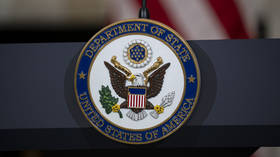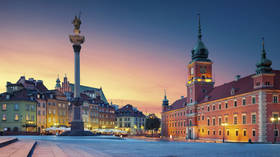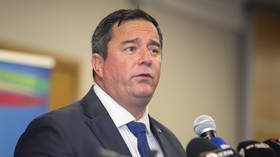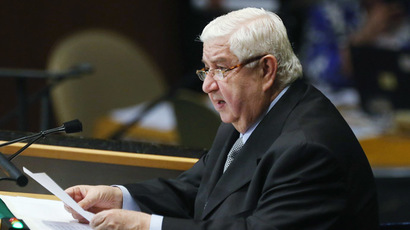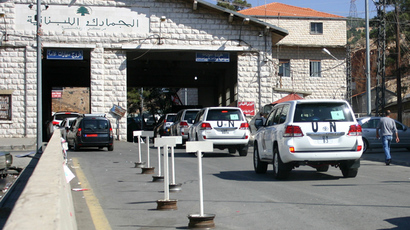Russia, US agree on how Syria should destroy chemical arsenal – Putin
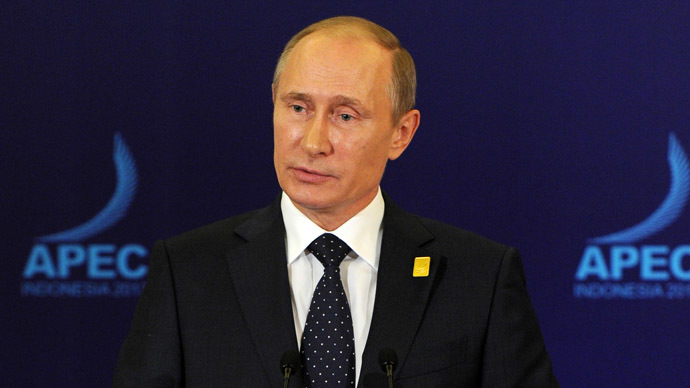
Russia and the US agree on how to destroy Syria’s chemical arms, President Vladimir Putin said after meeting with US Secretary of State John Kerry in Bali. He also said peace talks on Syria should include major players from the Muslim world.
Despite President Barack Obama’s conspicuous absence from the Indonesian island of Bali, where the Asia-Pacific Economic Cooperation (APEC) is holding a trade summit, Putin praised his US counterpart for finding common ground on Syria.
After speaking with Kerry on the sidelines of the summit, Putin said both sides had reached a “mutual understanding” on chemical weapons disarmament in Syria.
“First of all, the dialogue was in the present context of Syria. We have a mutual understanding regarding what must be done, and how we should do it. I am very glad that President Obama has taken such a position. For him it has not been a simple situation, and he has taken such a decision… that has allowed a way out of the tragedy in Syria,” Putin told reporters at the end of the summit.
Putin said that he and Kerry had discussed how to arrange further work on the destruction of chemical weapons in Syria, and that experts would be able to achieve their goal of eliminating Syria’s chemical arms within a year.
He also discussed the way forward for the Geneva-2 peace talks, and how other Muslim countries not party to the conflict could play a role in finding a diplomatic solution to the Syrian crisis.
“One of our priorities today is not just the destruction of [Syria’s] chemical weapons, but also the renewal of the negotiations process between all conflicting parties on the Geneva [peace conference] platform,” Putin said.
“In connection with this, I can stay that we’ve considered the possibility of expanding the number of participants, including those major governments [in the Islamic world] such as Indonesia.”
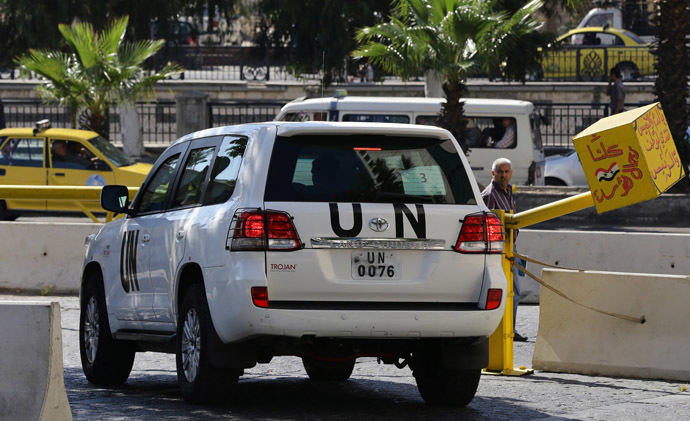
Putin said that, as the world’s largest Muslim state, with the largest Muslim population, Indonesia’s participation in Geneva-2 “would be quite natural and we would welcome it.”
The Organization for the Prohibition of Chemical Weapons said
Tuesday it was sending a second team of inspectors to Syria to
help destroy chemical arms stockpiles.
The Syrian government had made “a constructive beginning for
what will nonetheless be a long and difficult process,” Ahmet
Uzumcu, the head of the chemical weapons watchdog, said in a
statement.
The efficacy of a Geneva-2 peace conference remains in doubt, however, as the Western-backed Syrian opposition group – the Syrian National Coalition (SNC) – produced a list of conditions that needed to be “guaranteed” before it would participate.
“We do not reject participation in Geneva-2 but we request guarantees for its success. And if we receive these guarantees we will show them to the military leaders,” Syrian National Coalition chairman Ahmed Jarba told reporters in Istanbul on Monday.
Referring to Iran as an “enemy” and “occupier” of Syria, the SNC said that Tehran should not act as a “mediator” at the conference. Jarba also demanded that “Hezbollah leave Syria.”
The SNC leader also said that there would be “no dialogue with
the criminal Assad regime.”
“Nationalist dialogue is only with nationalists,” Jarba
said.
‘No negotiations’ with Syrian extremist fighters
Meanwhile, Russian Foreign Minister Sergey Lavrov told RT there
must be no negotiations with the extremist groups fighting in
Syria, and that the US now shares that view.
The Syrian extremists “are moving closer to Al-Qaeda,”
rather than sharing the ideals of the Free Syrian Army, which has
been “portrayed as a secular armed opposition,” Lavrov
said. He also voiced concern that the radical Islamists are
gaining weight in the ranks of the Syrian opposition.
“It is not only our conviction – it is also the conviction of
the Americans – that we cannot and must not talk to these people.
We can only talk to those who opt for the sovereign,
territorially integral, secular, multiethnic, multi-confessional
Syria,” Lavrov said, stressing the importance of having a
“right mix of the opposition groups” at the Geneva-2 peace
conference.
Lavrov said that “the truth and this understanding of the
danger of the radicals… to Syria and the North African region in
general is being understood more and more,” although some
parties who had not previously share such view “had difficulty
in admitting that they were wrong.”
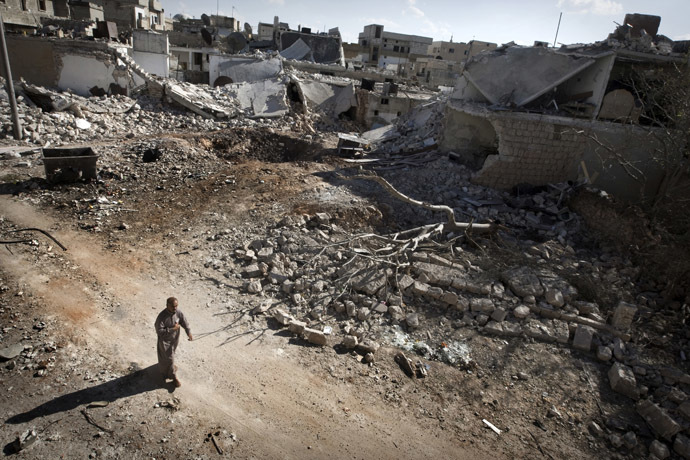
Despite ongoing difficulties in bringing the Syrian opposition to
the negotiating table, Kerry said on Monday the US has agreed
with Russia to move toward Syria peace talks as soon as possible.
Kerry, who met with Russian Foreign Minister Sergey Lavrov on the
sidelines of the APEC summit, said both sides are in favor of
holding the Geneva-2 peace conference on Syria in mid-November
and have agreed to press the UN to set a date for the event.
Kerry further credited the Assad government for complying with the chemical weapons deal hammered out by Russia and the United States in Geneva last month.
“The process has begun in record time and we are appreciative for the Russian cooperation and obviously for the Syrian compliance," Kerry said.
Lavrov said Damascus had “flawlessly cooperated with the international inspectors.”
Meanwhile, the UN and the Organization for the Prohibition of Chemical Weapons (OPCW) said that they had begun eliminating Syria’s estimated 1,000-ton chemical weapons stockpile Sunday.
"It was an excellent first day, with the stress on the word 'first'," an OPCW official who asked not to be named told Reuters by telephone from Damascus on Monday.
Experts from the OPCW are aiming to oversee the destruction of
Syria's chemical weapons production and mixing equipment by
November 1, and deal with all chemical weapons materials by the
end of June 2014.




